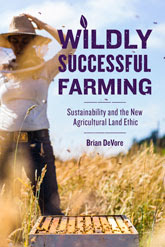Although DeVore's talk and readings offered evidence that farming does not have to function as an extractive industry, the hangings on the wall of the gallery in which the DeVore talk occurred were the highlight of the evening, particularly those by/from Tin Cat Studio. Many of their framed prints made me think of the poetry of Ted Kooser and his nonfiction book Local Wonders. Since we already have several prints and broadsides that need framing and a home on our walls, the BH and I concurred in holding off on new acquisitions until we know where we can hang them. It's likely we'll find our way back to the restaurant and gallery. Maybe the BH will specify the pork chops should be well done or she'll follow my lead and order a burger. There's an outside patio that should be a treat on a warm Autumn evening.
To return to DeVore's book and talk and some of the points he raised, we recalled the number of times we've heard or read that "organic food is fine for rich people, but the rest of us can't afford it." We understand the point raised, and suggest that the poverty involved is as much a factor of time and education as it is of dollars. Eating and cooking from scratch is a different life than heating frozen or otherwise prepared food. We've given up on Summer Community Supported Agriculture shares because, even with half shares, we end up with more kale and zucchini than one of us is willing to eat. Much as we're in favor of local foods, we're hard pressed, at least so far, to rationalize paying $20 for 5 pounds of locally milled wheat when we can get King Arthur flour from an employee-owned company for about a $1 a pound.
 |
| abandoned house on a farm
Photo by J. Harrington
|
On the other hand, we vehemently oppose industrial farming and concentrated animal feeding operations (CAFOs). Read Michael Pollan's The Omnivore's Dilemma for insights as to why. We believe one of the worst things that ever happened to agriculture and rural America is that people listened to Earl Butz when he told farmers to "Get big or get out." Market consolidation, as exemplified by Amazon, as has happened in the agriculture sector and is happening in the health field and has long been a detrimental aspect of our two-party political system, is much more beneficial to oligarchs than it is to those who must work for others to ear and pay for shelter. It's been awhile since an evening's entertainment has triggered as much thinking. We believe books like DeVore's, and Wendell Berry's Unsettling of America, and James Howard Kunstler's Long Emergency, and Miriam Horn's Rancher, Farmer, Fisherman, can help us picture the American we want and need to produce and prepare healthy, nutritious, tasty food from the kind of healthy, successful farms which help comprise healthy and sustainable communities and urban centers. One way to help bridge the "urban-rural divide" is to get back to visiting each other more often, and don't forget to bring an open mind.
Abandoned Farmhouse
By Ted Kooser
He was a big man, says the size of his shoeson a pile of broken dishes by the house;a tall man too, says the length of the bedin an upstairs room; and a good, God-fearing man,says the Bible with a broken backon the floor below the window, dusty with sun;but not a man for farming, say the fieldscluttered with boulders and the leaky barn.A woman lived with him, says the bedroom wallpapered with lilacs and the kitchen shelvescovered with oilcloth, and they had a child,says the sandbox made from a tractor tire.Money was scarce, say the jars of plum preservesand canned tomatoes sealed in the cellar hole.And the winters cold, say the rags in the window frames.It was lonely here, says the narrow country road.Something went wrong, says the empty housein the weed-choked yard. Stones in the fieldssay he was not a farmer; the still-sealed jarsin the cellar say she left in a nervous haste.And the child? Its toys are strewn in the yardlike branches after a storm—a rubber cow,a rusty tractor with a broken plow,a doll in overalls. Something went wrong, they say.
********************************************
Thanks for visiting. Come again when you can.
Please be kind to each other while you can.

No comments:
Post a Comment